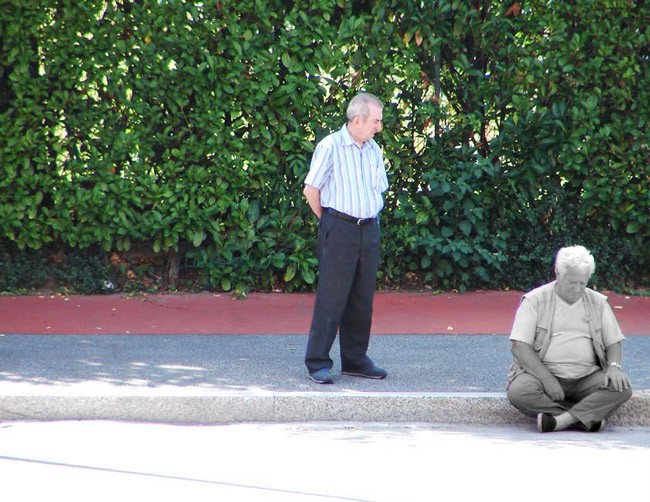
By Peter Singer
Can humans really be motivated by altruism? My new book, The Most Good You Can Do, discusses the emerging new movement called Effective Altruism, and, in doing interviews about the book, I am surprised by how often that question is asked.
Why should we doubt that some people act altruistically, at least some of the time? In evolutionary terms, we can easily understand altruism toward kin and others who can reciprocate our help. It seems plausible that once our ability to reason and reflect has developed sufficiently enough to enable us to understand that strangers can suffer and enjoy life just as we can, then at least some of us would act altruistically toward strangers, too.
The polling organization Gallup asked people in 135 countries whether they had, in the last month, donated money to a charity, volunteered their time to an organization, or helped a stranger. Gallup’s results, which form the basis of the World Giving Index 2014, indicate that approximately 2.3 billion people, a third of the world’s population, perform at least one altruistic act per month.
More objective evidence of altruism buttresses these findings. In many countries, the supply of blood for medical purposes relies on voluntary, anonymous donations. Worldwide, more than 11 million people have put their names on donor registries for bone marrow, signifying their willingness to donate their marrow to a stranger. A small but growing number of people have gone further still, donating a kidney to a stranger. There were 177 altruistic donations by living donors in the United States in 2013 and 118 in the United Kingdom in the year to April 2014.
Then there are those who donate to charity. In the US alone, individuals gave $240 billion to charity in 2013. Foundations and corporations topped this up to a total of $335 billion, or about 2 percent of gross national income.
The US is often said to be more charitable than other countries; but, in terms of the proportion of the population donating money, Myanmar, Malta, Ireland, the UK, Canada, the Netherlands, and Iceland all do better. In Myanmar, 91 percent of the people surveyed had given money in the past month (the corresponding figure for the US is 68 percent), indicating the strong hold of the Theravada Buddhist tradition of donating to support monks and nuns. Myanmar also had the highest percentage of people volunteering time (51 percent).
The US did, however, have the highest ranking for “helping a stranger.” That, together with a high ranking for volunteering time, led it to tie with Myanmar as the most generous nation in the world.
Admittedly, not all of this giving is altruistic. New York’s Lincoln Center announced last month that the billionaire entertainment industry mogul David Geffen has donated $100 million toward the renovation of its concert facility, Avery Fisher Hall, on the condition that it is renamed David Geffen Hall.
The US has the highest ranking for “helping a stranger,” tying it with Myanmar as the most generous nation in the world.
That gift seems motivated more by a desire for fame than a desire to do good. After all, as Geffen presumably knew, the family of Avery Fisher had to be compensated with a payment of $15 million in order to agree to the renaming. In any case, in a world with a billion people living in extreme poverty, it would not be difficult for an altruist to appreciate that there are many ways of doing more good than renovating a concert hall for well-off music lovers.
At the opposite end of the giving spectrum, psychologists who study giving behavior have suggested that people who give small sums of money to a large number of charities may be motivated less by the desire to help others than by the warm glow they get from making a donation. By contrast, other donors give larger sums, usually to only a handful of charities chosen on the basis of some knowledge about what the charity is doing. They want to have a positive impact on the world. Their gifts may also make their lives better, but this is not what motivates them.
The Effective Altruism movement consists of people who give in the latter way, combining the head and the heart. Their aim is to do the most good they can with the resources that they are willing to set aside for that purpose.
Those resources may include a tenth, a quarter, or even half of their income. Their altruism may include their time and talents, and influence their choice of career. To achieve their aims, they use reason and evidence to ensure that whatever resources they devote to doing good will be as effective as possible.
Several studies show that people who are generous are typically happier and more satisfied with their lives than those who do not give. And other studies show that giving leads to activity in the reward centers of the brain (the areas of the brain that are also stimulated by tasty food and sex).
But this does not mean that these donors are not altruistic. Their direct motive is to help others, and their giving makes them happier only as a consequence of the fact that it does help others. If we had more such people, we would have more giving, and that is what we want. To define “altruism” so narrowly that the term can be applied only when giving is contrary to a person’s overall interest would miss the point that the best situation to bring about is one in which promoting the interests of others harmonizes with promoting one’s own.
![]()
 Peter Singer is Professor of Bioethics at Princeton University and Laureate Professor at the University of Melbourne. His books include Animal Liberation, Practical Ethics, One World, The Ethics of What We Eat (with Jim Mason), Rethinking Life and Death, The Point of View of the Universe, co-authored with Katarzyna de Lazari-Radek, and, most recently, The Most Good You Can Do, which was published this month. In 2013, he was named the world’s third “most influential contemporary thinker” by the Gottlieb Duttweiler Institute. © Project Syndicate.
Peter Singer is Professor of Bioethics at Princeton University and Laureate Professor at the University of Melbourne. His books include Animal Liberation, Practical Ethics, One World, The Ethics of What We Eat (with Jim Mason), Rethinking Life and Death, The Point of View of the Universe, co-authored with Katarzyna de Lazari-Radek, and, most recently, The Most Good You Can Do, which was published this month. In 2013, he was named the world’s third “most influential contemporary thinker” by the Gottlieb Duttweiler Institute. © Project Syndicate.





























Leave a Reply